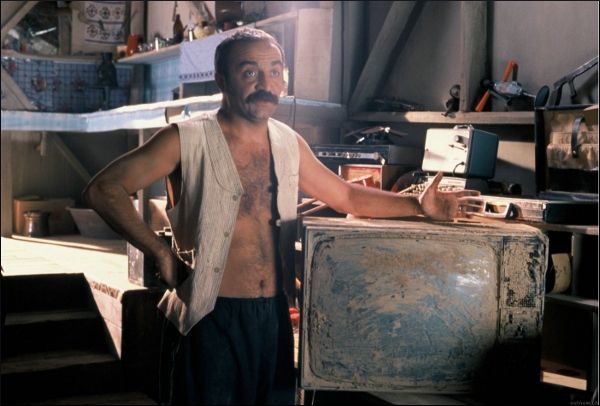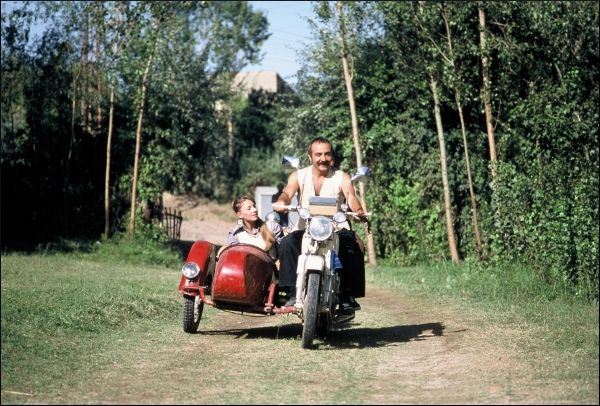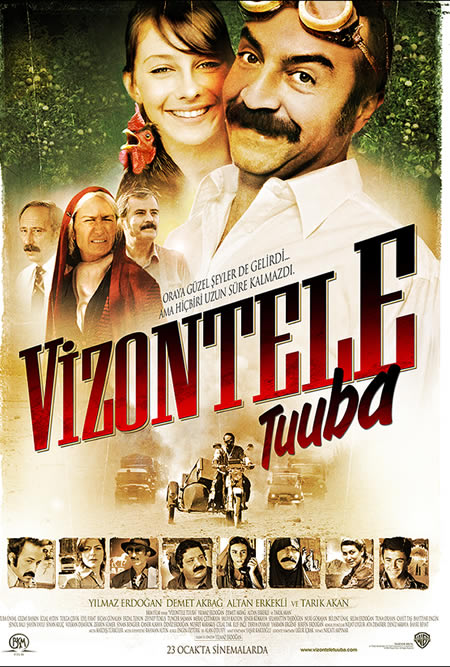The movie portrays Turkey during the 1980s, when rightist and leftist forces clashed and, because of the chaos and killing, there was a coup. A teacher named Güner (Tarık Akan), who used to be a leftist, is sent to a small village by the army to be a library director. He moves there with his wife and disabled daughter, but the problem is that there is no library at the village. Güner has to open a library with the help of the villagers, but another problem arises after that: most of the villagers don’t know how to read or write. So, Güner tries to teach them, and the movie shows village life under the command of the army.
Vizontele Tuuba is based on writer, director, and star Yılmaz Erdoğan’s memories. The movie may look like a sequel to his earlier Vizontele, but both movies don’t share many connections. The only link is the presence of television, which was a novelty in Vizontele but, in Vizontele Tuuba, is in almost everyone’s house. The latter film perfectly depicts life after the 1980 coup. When the army began directing the country, most leftist activists were put in jails or sent to villages. Protesters were punished, and as is seen in Vizontele Tuuba, a leftist government worker could be sent as a library director to a village where there was no library. These kinds of absurd decisions were made back then.
"The movie may look like a sequel to the earlier Vizontele, but both movies don’t share many connections."
In the beginning of the movie, a kid says to his mother, “Chick arrived.” The mother replies, “Just one chick?” Here we see the typical Turkish usage of singular/plural terms. Sometimes, a singular word can mean a plural, like in this example, in which the kid actually means “chicks” but says a singular form of it and generates confusion. This usage can mostly be seen in Southern Turkey. As in the first Vizontele, when a government employee travels to the village all the villagers prepare a welcoming festival. It doesn’t matter who arrives; as long as a visitor is from the capital city, the villagers think he or she is educated and a very important man or woman.

In another scene, during a phone conversation, we notice how people show respect for each other even if they are not close. When they refer to “you,” they actually use the plural form of “sen” (you), which is “siz.” Likewise, instead of “ben” (I), they say “biz” (we). Elsewhere in the movie, Güner explains how he was acquitted. He says, “I was translating a law book, and in the middle of that I was arrested. During my prison time, I finished the translation, and I used it as my defence so they let me go free.” This shows how the law worked in Turkey during the 1980s. The village mayor, his friends, and Güner eat lunch and laugh about the entire situation, that is, about the army sending a teacher to be a library director in a village where there are no libraries or books. To build a library, manpower is needed, but the villagers don’t know what a library is. Also, supposedly, Güner was supposed to lodge with a doctor, but the government never sent a doctor to the village. Here, we see how the government, in those times, never cared about the southern cities and villages of Turkey. Güner sees youngsters who are leftist and rightist though they know only a little bit about politics, so he decides to teach them what communism actually means to leftists and what capitalism means to rightists. We notice, here, how villagers had been used rather than educated by politicians.
During the movie’s production, Yılmaz Erdoğan was in a relationship with Tuba Ünsal, a top Turkish model and star of this film. According to gossip, that’s why it’s called Vizontele Tuuba. Also, when Tuuba is pronounced, the first three letters (Tuu) sound like “two,” which makes the title Vizontele Two according to Yılmaz Erdoğan’s explanation (that is, the sequel to the original Vizontele). At any rate, this film was very much loved by Turkish audiences. It’s not just funny and emotional, but one of the few Turkish movies that show the real life of villagers during the 80s, when the army was in power.





